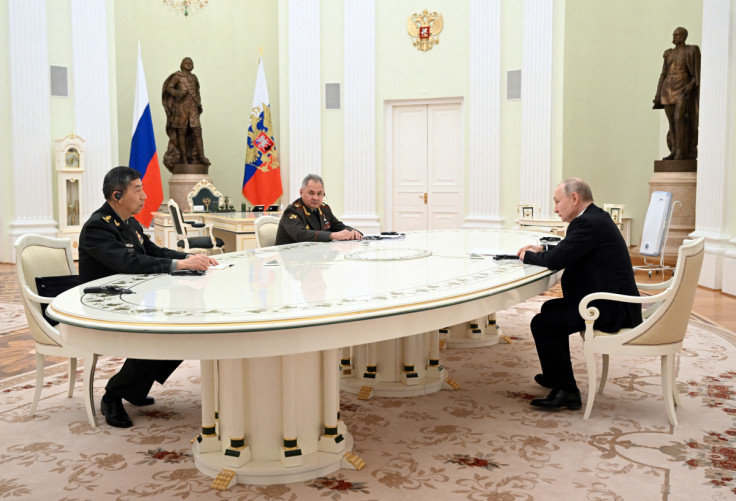Chinese defence minister praises Putin for 'promoting world peace'
Beijing has been a staunch supporter of Russia since Putin declared war on Ukraine.

Chinese defence minister Li Shangfu praised Russia for "promoting world peace" during his four-day visit to the state. The minister's visit came a month after Chinese President Xi Jinping paid a visit to the country.
"Mr. president is an extraordinary state leader deeply loved by the Russian people, [who] has made excellent achievements in leading the development and revitalisation of Russia, and made important contributions to promoting world peace and development," The Moscow Times quoted Li as saying.
"We have very strong ties. They surpass the military-political alliances of the Cold War era... They are very stable," he said in translated remarks broadcast on Russian TV. The minister began his visit on Sunday and will be returning on April 19.
“Relations between Russia and China are superior to the military alliances of the Cold War” China Defense Minister Li Shangfu
— LogKa (@LogKa11) April 16, 2023
He is sanctioned by the US for facilitating weapons deal between China and Russia. pic.twitter.com/JFtiWKOTUl
On the first day of his trip, the minister met with Russian President Vladimir Putin and Defence Minister Sergei Shoigu. In a statement issued after the meeting, Li made it clear that China and Russia intend to continue to work together in the field of military-technical cooperation.
He is also set to hold talks with Russian military leaders and visit Russian military academies, according to a report by the Global Times. Li's visit to the state is the first such visit by a Chinese defence minister since the beginning of the Russia-Ukraine war last year.
China had earlier declared a "no-limits" friendship with Russia and has refused to call Russia's war on Ukraine an invasion. Beijing has been a staunch supporter of Russia since Putin declared war on Ukraine.
It has continued to support Russia even as much of the world continues to condemn Putin's war in Ukraine. China has continued to condone Russian actions even though it claims that the sovereignty and territorial integrity of all nations must be upheld.
But why is China supporting Russia?
Moscow and Beijing have ramped up cooperation since the Russian invasion of Ukraine. Rallying behind Russia could be a way for China to secure Russian help in case it ever enters into an armed conflict with Taiwan.
China considers Taiwan to be its breakaway province. It has never ruled out the use of force to bring Taipei under its control, but since Taiwanese President Tsai Ing-wen took office in May last year, Beijing fears the democratic leader may seek independence for the self-ruled nation.
Taiwan has long warned Beijing against increasing its military activities in its airspace, but China has only increased military activities in the past two years to force Taiwan to accept its rule.
China has ramped up economic, military, and diplomatic pressure on the island over the last few months. It has long defended flying over and around Taiwan and Japan as legal and reasonable and insisted that China has never targeted any specific country or region during these manoeuvres.
Taiwan has been on alert since Russia invaded Ukraine and believes that China could make a similar move. In such a background, China supporting Russia makes sense politically. However, Taiwan is not the only issue for China, the country has boundary disputes with several nations, including India, Nepal, Bhutan, China, and Myanmar.
Russia is, in fact, one of the few players, that has managed to resolve its territorial disputes with China by signing three border agreements over the years.
"One day, if we face a crisis over the Taiwan Strait, I guess it [China] would also need different kinds of support from Russia if such a conflict takes place, so that's one thing [we could see]," Alicja Bachulska, a policy fellow at the European Council on Foreign Relations, told CNBC.
The two countries also see Western nations as their adversaries and share a mutual disdain for NATO. They wish to see a world that no longer has the US as its focal point. In other words, they want to see a multipolar world.
The aforementioned factors, coupled with China's aggressive expansionist policy, could be the reason behind China extending its support to Russia. Therefore, supporting Russia might just be its way of ensuring support for itself in future conflicts.
© Copyright IBTimes 2024. All rights reserved.






